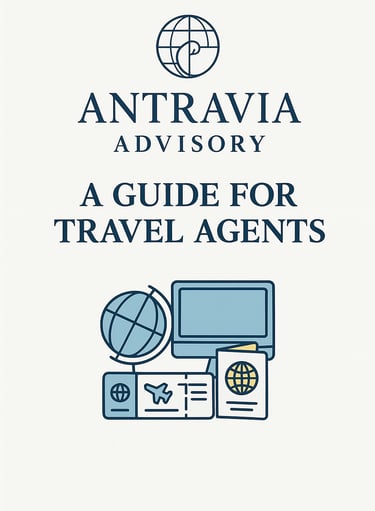
Travel Agent Finance Guide 2025: Industry Outlook | Antravia
Part 1.1 of Antravia’s Travel Agent Finance Guide explores the state of the travel agency industry in 2025. With global sales forecast to reach $466 billion, this guide explains why travelers are relying on professional advisors for cruises, wellness trips, and complex itineraries, and what these trends mean for agents planning sustainable, profitable businesses.
ANTRAVIA TRAVEL AGENT GUIDE
1/2/20256 min read


Part 1 – Becoming a Travel Agent the Right Way
In the opening section of our Travel Agent Finance Guide, we focus on what separates thriving travel advisors from those who struggle. This part examines income benchmarks across the industry, why few agents reach six figures, and how top performers structure their businesses differently. We look at the role of planning fees and diversified revenue, analyze shifts in client demand, and share case studies of agents who have built sustainable models. The goal is to give a clear picture of what financial success looks like in practice—and how you can position your agency to achieve it.
1.1: The Industry Today
The size of the U.S. travel advisor market — real data and revenue benchmarks
Where growth is happening: luxury, corporate, cruises, groups, wellness
How host agencies dominate the landscape — and why they remain popular
The rise of independent advisors and what’s changed post-2020
2024–2025 outlook: who is spending, and where
1.2: Host Agency vs. Independent
What a host agency actually does: commission splits, supplier access, support
Key financial differences: overrides, insurance, credit card processing
Hidden costs and contract clauses that affect your bottom line
When to move away from a host: red flags and readiness benchmarks
Real examples of agents transitioning — both successfully and not
1.3: What Successful Agents Do Differently
Why most agents fail: pricing mistakes, poor systems, burnout
Traits of top advisors: proactive pricing, real tracking, strategic delegation
What high-performing agents track: revenue per client, time spent, margins
Adding fees to commissions: what works and where
Case studies from Antravia clients who scaled strategically
1.4: Understanding Client Demand in 2025
Why Gen Z, Millennials, and luxury Boomers are driving change
Growth in niche segments: food travel, rail, wellness, sustainability
77% of travelers want personalization, and what that means for advisors
What’s actually selling now, and how agents can reposition around it
How to price your expertise in a shifting buyer landscape


Part 1 - The Industry today
The State of the Travel Agent Industry in 2025
The travel agency sector has not only recovered from the pandemic downturn but is currently showing consistent growth. According to Future Market Insights, the global travel agency services market is expected to rise from approximately USD$ 431 billion in 2024 to USD$ 466 billion in 2025, with analysts projecting annual growth of more than 8% over the coming years. This expansion is being driven by a rebound in long-haul and luxury travel, a steady rise in cruise bookings, and renewed demand for curated experiences (see references section below)
Online booking channels continue to dominate transaction volume, yet specialist and full service advisors are claiming a larger share of the market especially where clients value planning, access, and support. Data from Grand View Research shows that while the online travel agency sector is forecast to generate around USD$ 664 billion in 2025, traditional and hybrid travel agencies are growing faster in segments like cruises, multi-stop itineraries, and wellness travel, where clients actively seek human guidance and interaction.
In North America, the role of the travel agent/advisor has become particularly clear. Recent Phocuswright research further suggest that nearly two-thirds of leisure travel bookings now are booked through travel agencies, significantly up from pre-pandemic levels. Cruise bookings are a key factor, with volumes in 2023 more than doubling compared with 2022 and almost two-thirds of these bookings handled by agents. Current industry forecasts indicate that, by 2027, travel advisors will be responsible for roughly a quarter of all travel sales in the United States.
New Clients?
The clients driving this growth are not just looking for the cheapest deals. Wellness tourism, complex trips, and flexible travel plans are very much shaping demand. The Global Wellness Institute details that wellness travelers spend more than twice as much per trip as the average leisure traveler. Expedia Group’s Traveler Value Index also shows that over 40 % of travelers in 2025 intend to combine business and leisure travel, and almost half expect to book flexible arrangements rather than fixed packages. These trends favour agents that can design complex itineraries, adapt plans when circumstances change, and act as a single point of contact for the client from booking through to travel.
This shift has also changed how advisors earn. Rather than relying solely on supplier commissions, many successful advisors also now charge planning fees, often between USD$ 150 and USD$ 200 per day for complex trips. This reflects the time and expertise needed to build various multi-destination itineraries, access properties or events, and provide real-time support throughout the journey. Barron’s notes that high-end travel advisors using this model often achieve higher client retention and greater profitability than those relying only on supplier revenue.
What defines a modern travel agent
Today’s top travel agents and advisors focus on specialization and building long-term relationships. Many build their businesses around niche markets, such as luxury, wellness, culinary tourism, or multigenerational travel, where their expertise can command both loyalty and higher fees. They rely heavily on referrals, repeat clients, and a curated social media presence as opposed to large-scale advertising. Clients choose them, not simply to book travel but to solve problems, reduce risk, and deliver experiences that cannot be packaged online.
While online travel agencies continue to grow, their model does not displace the need for personalized service. For complex or high-value trips, a trusted advisor remains a preferred choice for discerning clients.
Industry Outlook
Employment for travel advisors in the United States is expected to grow by around 3% per year through to 2033, matching the general employment growth rate across all industries. The U.S. Bureau of Labor Statistics reports that median annual pay, including commissions, was USD$ 48,450 as of May 2024. Many specialists earn well above this figure through service fees, additional commissions and supplier incentives.
Travel sentiment also continues to remain strong. Surveys compiled by IPX1031 show that more than 90% of Americans plan to travel by air or road in 2025. Cruise and airline companies reported a surge in advance bookings through late 2024, and Investor’s Business Daily highlights that cruise operators and booking platforms saw significant stock gains entering 2025 on the back of that demand.
Online travel agencies, while still expanding, are projected by Grand View Research to grow at roughly 4% to 6% per year over the next five years. Human advisors/agents, by contrast, are securing growth in areas where automation falls short, such as custom experiences, complex logistics, and high-value clients.
Why is this important?
Antravia belives that the data make one point clear: there is space for travel agents to thrive in 2025, but only for those who treat their work as a professional service, not as a sideline. Advisors who specialize, build recurring client relationships, and price their expertise appropriately are the ones building sustainable businesses. Those who compete on price or operate without proper financial systems struggle to survive.
Antravia Case Study: A growing niche Agency
A small travel agency based in Florida shifted its focus entirely to wellness and multi-generational travel in early 2023. According to internal figures the owner shared at a regional industry panel, the agency’s annual sales rose from just over USD$ 450,000 to USD$ 1.2 million by the end of 2024. About half of that increase came from planning fees, which ranged between USD$ 150 and USD$ 250 per day for custom itineraries.
The owner explained that these fees covered detailed planning, ongoing support during travel, and access to properties where the agency had established relationships. By pairing fee income with commissions and overrides, the business was able to triple its revenue while reducing the number of clients it served by almost 20%. This allowed for more personalised service and improved profitability, even as competition from online booking platforms continued to rise.
ooo00ooo
References for Part 1
Future Market Insights – Travel Agency Services Market Share & Forecast 2025–2035
Future Market Insights projects the travel agency services market to grow from USD 430.97 billion in 2024 to USD 465.81 billion in 2025, with a compound annual growth rate of about 8.1 %.
Link: https://www.futuremarketinsights.com/reports/travel-agency-servicesGrand View Research – Online Travel Agencies Market Size & Outlook
Grand View Research estimates the global online travel agency market at USD 612.95 billion in 2024, growing to USD 663.7 billion in 2025, with a projected 8.6 % CAGR through 2030.
Link: https://www.grandviewresearch.com/industry-analysis/online-travel-agencies-market-reportPhocuswright – U.S. Travel Agency Landscape
Phocuswright reports that leisure travel bookings through agencies grew by 28 % in 2023, reaching USD 109.7 billion in gross bookings, with forecasts for 9 % annual growth through 2025. By 2027, travel advisors are projected to manage 25 % of all U.S. travel sales.
Link: https://www.phocuswire.com/united-states-travel-agency-market-resilient-phocuswright-researchGlobal Wellness Institute / Expedia Group Traveler Value Index
Industry research cited by these sources shows that wellness travelers spend more than twice the average tourist, and that over 40 % of travelers in 2025 intend to combine business and leisure trips, with almost half expecting flexible stays over fixed packages.
(Reported via industry coverage and aggregated data.)
Link (Expedia Partner Page): https://partner.expediagroup.com/en-us/resources/blog/2025-traveler-value-index-highlightsBarron’s – High-End Travel Bookings Are Up. It’s a Good Sign for the Economy
Barron’s highlights that the luxury travel segment is expected to grow by 5.2 % in 2025, and that many high-end advisors now charge USD 150–200 per day in planning fees, improving profitability and client retention.
Link: https://www.barrons.com/articles/luxury-travel-economy-booking-outlook-fe2dafc9U.S. Bureau of Labor Statistics – Occupational Outlook Handbook: Travel Agents
The Bureau of Labor Statistics projects 3 % annual employment growth for travel agents from 2023 to 2033, with median annual pay of USD 48,450 (as of May 2024).
Link: https://www.bls.gov/ooh/sales/travel-agents.htmInvestor’s Business Daily – Travel Industry Stocks and Booking Trends 2025
Investor’s Business Daily reports that airline and cruise company stocks rose sharply in late 2024, driven by strong advance bookings, indicating sustained demand for travel into 2025.
Link: https://www.investors.com/news/airline-stocks-cruise-lines-travel-industry-2025-forecast
Antravia Advisory
Where Travel Meets Smart Finance
Email:
Contact us:
Antravia LLC
© 2025. All rights reserved. | Disclaimer | Privacy Policy | Terms of Use | Accessibility Statement
Antravia.com - Global site of the Antravia Group.
Antravia.com | Antravia.co.uk | Antravia.ae |
Finance.travel | Tax.travel | Consultancy.travel | VAT.travel | VAT.claims |
USSales.tax | EuroVAT.tax | UKVAT.tax |
contact@antravia.com
Antravia LLC
4539 N 22nd St., Ste. N
Phoenix
Arizona
85016
